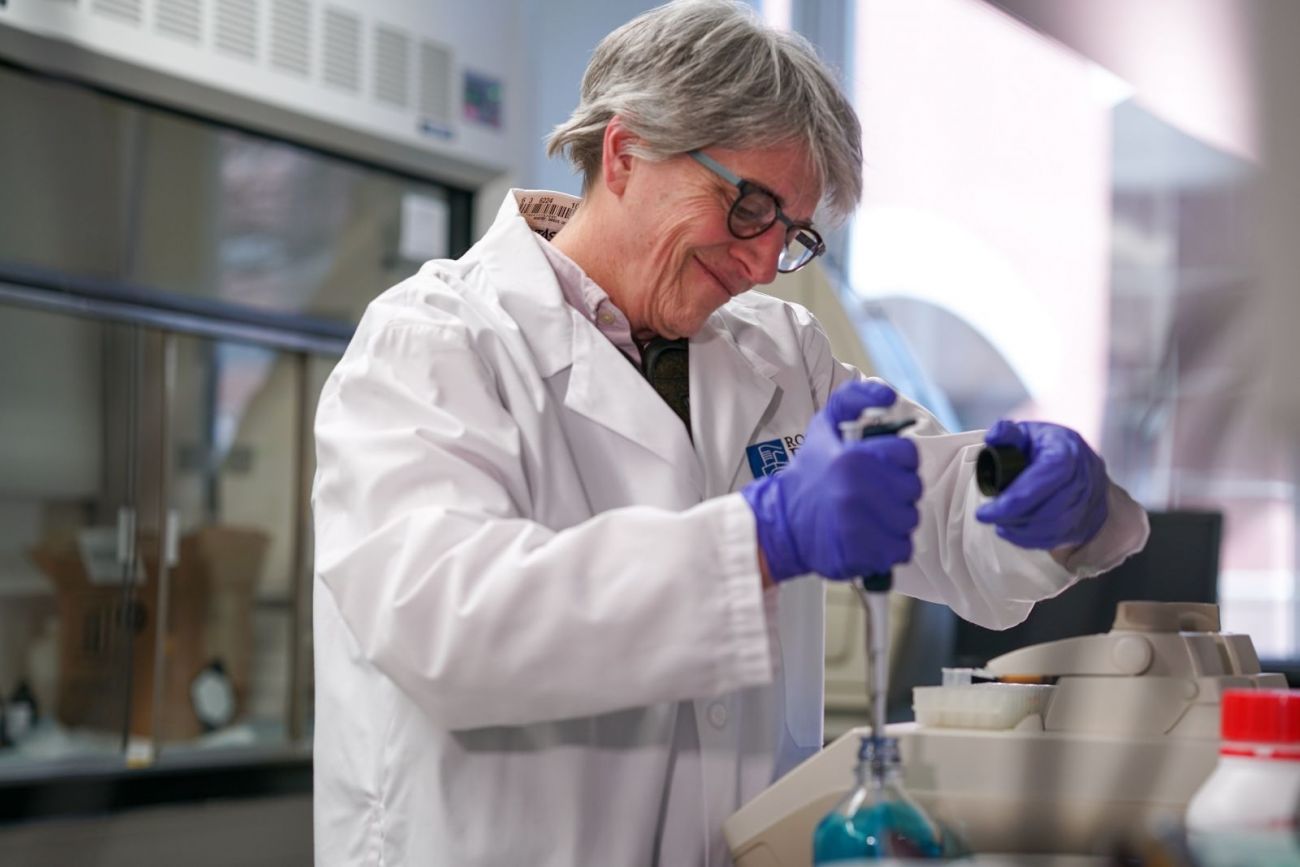PDT at Roswell Park
If you are eligible for PDT, your Roswell Park medical team and the team from the PDT Center will create a treatment plan specifically for you. We offer PDT for the following diseases:
- Esophagus
- Advanced, partially or totally obstructing cancer of the esophagus
- Barrett’s esophagus with high-grade dysplasia
- Gynecologic malignancies
- Lung
- Endobronchial lung tumors (advanced)
- Microinvasive (early) endobronchial non-small cell lung cancer
- Mesothelioma and other lung tumors
- Head and neck cancer
- Mouth, larynx, and neck cancer, and dysplasia
- Skin cancer
- Specific types
FDA-approved uses
Roswell Park offers FDA-approved PDT for the following diseases. For more information, call 1-800-ROSWELL to speak with one of our cancer experts.
Advanced, partially or totally obstructing cancer of the esophagus
The FDA has approved PDT with Photofrin® to relieve symptoms in patients with advanced cancer of the esophagus, where the esophagus is totally or partially blocked.
Barrett's esophagus with high-grade dysplasia
To be eligible for this therapy, you must have high-grade dysplasia (abnormal cells) caused by Barrett's esophagus. The treatment can be repeated if needed.
Microinvasive (early) endobronchial non-small cell lung cancer
The FDA has approved PDT with Photofrin® for the treatment of microinvasive (early) endobronchial non-small cell lung cancer in patients who are not eligible for surgery and radiation therapy. The cancer must be located in an airway and accessible with a bronchoscope (a flexible instrument used to see inside the airways).
Endobronchial lung tumors (dvanced)
The FDA has approved PDT with Photofrin® for certain early- and late-stage lung tumors. Tumors must be accessible with a bronchoscope.
Off-label use
Off-label use of a drug means that the drug has been approved by the FDA for a specific disease or condition, but it is being prescribed for a different, unapproved use or condition. FDA regulations allow doctors to prescribe medications off-label, and sometimes the medications’ effectiveness for an off-label use can lead to FDA approval for that new use. For example, sildenafil (Viagra) was originally approved by the FDA to treat angina (chest pain caused by inadequate blood flow to the heart), but off-label use showed that it could also be effective in treating erectile dysfunction.
Roswell Park physicians sometimes offer patients off-label use of Photofrin, one type of photosensitizer used in PDT, for treatment of such diseases as oral cancer. While Photofrin is not FDA-approved for oral cancer, is has been shown to be effective for that use.
Roswell Park treats these diseases with PDT off-label:
Gynecologic malignancies
Gynecologic tumors often occur in areas that can be accessed easily by the red light used in PDT. PDT with Photofrin® may be effective in certain cases for treating tumors of the vagina, vulva and cervix. In recurrent tumors, this therapy has sometimes resulted in long-lasting results.
Head & neck cancer and dysplasia
PDT can be used effectively for cancers or dysplasias (areas with abnormal cells) in the mouth, including the tongue, cheek, floor of the mouth, roof of the mouth and other areas. The majority of procedures are done on an outpatient basis.
Skin cancers
Skin cancers are treated using PDT in conjunction with the Dermatology Department at Roswell Park. These types of skin cancer may be treated effectively with PDT:
- Basal cell carcinoma, the most common type of skin cancer
- Bowen's disease
- Nevoid basal cell carcinoma syndrome (NBCCS)
A menu of photosensitizers
We select from a menu of different types of photosensitizers available from pharmaceutical companies around the world, based on your specific needs, including age and overall health.
Compassionate use
If you are seriously ill and no other treatment options are available, your Roswell Park team may request permission from the FDA treat you with PDT even if the FDA has not approved PDT for your condition. This decision is made after carefully weighing the potential benefits or risks to you. If it’s determined that PDT is a good option for you, your oncologist will work with Roswell Park’s Director of PDT Clinical Research to submit the request to the FDA. The approval process usually takes between two and four weeks.
